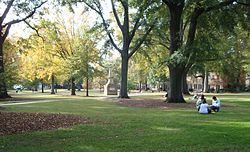| South Carolina Gamecocks | |||
|---|---|---|---|
 | |||
| Founded | 1978 | ||
| University | University of South Carolina | ||
| Head coach | Tony Annan (4th season) | ||
| Conference | Sun Belt | ||
| Location | Columbia, South Carolina | ||
| Stadium | Stone Stadium (Capacity: 5,700) | ||
| Nickname | Gamecocks | ||
| Colors | Garnet and black [1] | ||
| |||
| NCAA Tournament runner-up | |||
| 1993 | |||
| NCAA Tournament College Cup | |||
| 1988, 1993 | |||
| NCAA Tournament Quarterfinals | |||
| 1985, 1988, 1989, 1993 | |||
| NCAA Tournament Round of 16 | |||
| 1979, 1985, 1987, 1988, 1989, 1990, 1993, 1995, 1997, 1998, 2010 | |||
| NCAA Tournament Round of 32 | |||
| 1985, 1986, 1987, 1989, 1990, 1992, 1993, 1994, 1995, 1997, 1998, 2000, 2001, 2010, 2015, 2016 | |||
| NCAA Tournament appearances | |||
| 1979, 1985, 1986, 1987, 1988, 1989, 1990, 1992, 1993, 1994, 1995, 1997, 1998, 2000, 2001, 2002, 2004, 2005, 2010, 2011, 2015, 2016 | |||
| Conference Tournament championships | |||
| C-USA: 2005, 2010 | |||
| Conference Regular Season championships | |||
| Metro: 1993 C-USA: 2011 | |||
The South Carolina Gamecocks men's soccer team represents the University of South Carolina and, as of the 2022 college soccer season, competes in the Sun Belt Conference. The team is coached by Tony Annan, who succeeded Mark Berson as head coach after the 2020 season. [a] Berson had been the Gamecocks' only head coach since the program's inception in 1978 and had participated in 22 NCAA Tournaments, reaching the Quarterfinals on four occasions. Since 1981, South Carolina has played its home games at Stone Stadium, which is affectionately called "The Graveyard" by South Carolina fans due to an adjoining cemetery. [2] [3]
